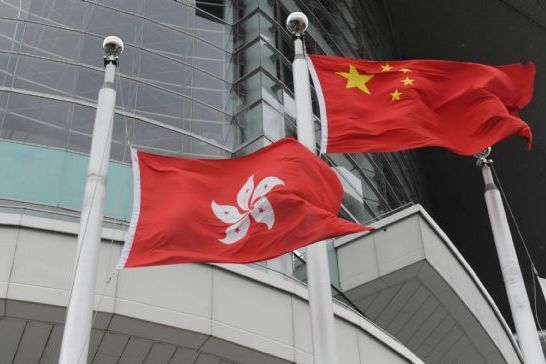With Occupy Central Over – Is Beijing Winning or Losing Hong Kong?

Please note that we are not authorised to provide any investment advice. The content on this page is for information purposes only.
On the morning of 11 December, in front of hundreds of cameras, police cleared the main protest site in Hong Kong. Ten 10 weeks of the pro-democracy Occupy Central movement, that at its peak attracted over 10,000 protesters, ended. Beijing can now happily claim a hard-won victory. However, in reality, Beijing is losing Hong Kong.
On the morning of 11 December, in front of hundreds of cameras, police cleared the main protest site in Hong Kong. Ten 10 weeks of the pro-democracy Occupy Central movement, that at its peak attracted over 10,000 protesters, ended. Beijing can now happily claim a hard-won victory. However, in reality, Beijing is losing Hong Kong.
While Beijing promises ‘one country, two systems’, it struggles to integrate Hong Kong economically with mainland China and to bring Hong Kong residents into the fold of a common Chinese identity. The ultimate goal is to unite China and Hong Kong into one country. To this end, Beijing has given the city’s investors and businesses preferential access to the Chinese market. It promotes people-to-people exchanges by lifting tourist restrictions for mainland Chinese to travel to Hong Kong. It has also tried to introduce ‘patriotic education’ into the Hong Kong school curriculum.
Beijing is quite successful in bringing Hong Kong closer to China economically. Last year, a staggering 40 million mainland visitors contributed to a third of the city’s total retail revenue. Today, roughly half of the city’s commerce is with China. But Beijing’s goal of winning the loyalty of the people has become increasingly out of reach. Hong Kong residents complain about rising commodity and housing prices caused by a mass influx of mainland visitors and investors. Young people are increasingly fearful of losing out to mainland Chinese as they compete for top-level university slots and employment opportunities. In 2012, massive resistance foiled the central government’s ‘patriotic education’ plan.
The city’s bubbling resentment towards China reflects in the polls. The percentage of Hong Kong residents that identify themselves as primarily Chinese is steadily declining, now only 31 per cent in the most recent poll. The number of young people aged 18–29 who claim an exclusively Chinese identity has dropped from 20–30 per cent a decade ago to a mere 4–8 per cent today. Unlike their parents and grandparents, most of whom migrated there from China; the majority of young people were born and raised in the city and have a much stronger desire for a separate local identity. These young people have taken to the streets. Beijing’s uncompromising stand has led to their increasing bitterness and may irrevocably steer them towards completely rejecting China and their Chinese heritage.
Across the strait, Taiwan’s ruling Kuomintang party (KMT) was the first casualty of Beijing’s unyielding position towards Hong Kong’s demands for genuine democracy. The party suffered a crushing defeat at the November elections. Chinese President Xi Jinping recently renewed a proposal to apply the ‘one country, two systems’ formula to Taiwan. While firmly rejecting Beijing’s new pitch, the KMT’s President Ma Ying-jeou has been pushing for closer ties with the mainland.
But many in Taiwan have concerns that parallel those in Hong Kong. The Sun Flower Student Movement last spring protested the Cross-Strait Service Trade Agreement, a trade pact that they feared would lead to rising real estate prices, hurt local small businesses and make the job market more competitive for Taiwan’s young should the anticipated large inflow of mainland investment and job seekers become a reality.
The Taiwanese had been watching the events in Hong Kong intently. Beijing’s tough handling of the protest movement only reminded them of the need to maintain a safe distance from mainland China. The landslide victory for the Democratic Progressive Party — that has always championed independence — has rendered Beijing’s hope for the self-governing island’s unification with China more remote than ever.
What can Beijing do to reverse this trend?
Beijing would be wise to grant the protesters’ demand for an unfettered election of their chief executives or, at the very least, make a meaningful concession before the next election. The most pressing grievances in Hong Kong result from the failure of their pro-business government to address the harmful effects that closer economic ties have brought on ordinary people. There have already been several mass rallies calling for the resignation of Leung Chun-Ying, the current chief executive. Leung’s two predecessors were also unpopular: Tung Chee-Hwa resigned due to poor performance, and blamed Tsang Yam-Kuen for increasing the gap between the rich and the poor. By allowing Hong Kong to choose its own chief executives, Beijing will foster goodwill in Hong Kong and give hope to the young generation.
More importantly, Beijing needs to promote political and legal reform at home. The primary source of Hong Kong’s alienation from China is not cultural but political. While the majority of the city’s residents attach themselves to ‘China’, that ‘China’ is not the People’s Republic. The PRC is where democracy is absent, the rule of law is limited, basic individual rights are tenuous, and corruption remains rampant. Hong Kong, with its multiparty system, independent judiciary, free press, and constitutional liberties, continues to be worlds apart.
In the end, Beijing must take bold measures to reform. A prosperous and democratic China will win back the disgruntled in Hong Kong and remove fears of an alarmed Taiwan.
Beijing is winning the battle but losing the war is republished with permission from East Asia Forum




